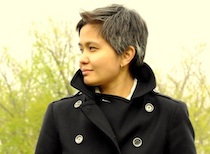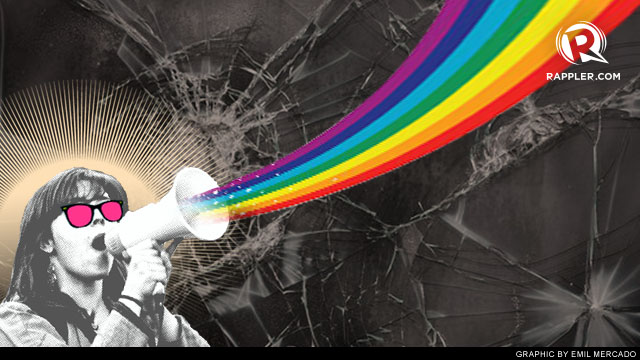SUMMARY
This is AI generated summarization, which may have errors. For context, always refer to the full article.

I came out in the late-90s and quickly discovered that Manila was not as progressive as I thought. I left my first job after I was dragged into the men’s room by male co-workers who wanted me to prove that I was “really a girl.” My manager said that I should be the one to adjust since I couldn’t keep quiet about my orientation. She called my near-assault experience “consequences.”
I was fortunate enough not to be harmed, and to be able to leave a workplace that didn’t want me. Still, the echoing sentiment seems to be that gays and lesbians may work alongside straight employees, but on the condition that they don’t make too much “noise.”
Whenever the topic of homosexuality is under discussion, someone inevitably groans in exasperation as if to say, “Oh god, here they go again. The gays always act like they’re so abused!”
People are definitely not shy about mocking my community about not being able to shut up already.
Gays are already ‘accepted?’
And come the claims that gays are already accepted because they are in television and they are able to exist among straight people without physical harm, as if the best we can hope for is to not be killed or beaten because that is the understood norm — never mind that this denigrates us as a kind of accepted violence magnet.
I don’t know if there is any other class of people that automatically deserves violence because of the difference in the way they act.
Saying we are already “accepted” is ignorant of our struggles as individuals and as families who should have equal rights as taxpaying citizens. By taking this view we are saying that it’s enough that gay people are on TV and in the streets even if we still can’t visit our spouses in the hospital or pass on our assets to our loved ones when we die.
Take a moment to imagine how you would feel if you were denied rights and privileges because of your family structure. I seriously doubt you’d feel accepted, or embrace other people’s standards on what constitutes equality.
I also don’t think you’d agree that it’s time for gays and lesbians to shut up.

Why can’t we shut up?
I once had a conversation with a young adult who asked why we can’t just shut up about labels, about gayness, about race.
“Can’t we forget about all of that and just be people?” “Sure, it’s easy for you to say that as a white and straight-looking lesbian. You are not subject to what gay people of color experience on a daily basis,” I said.
I don’t think she knew what I meant, and it is hard to explain this until you breathe bias and stereotypes every day.
Labels empower people. By claiming the taunts “Bakla!” and “Tomboy!” and calling ourselves by those names, we render these words powerless, and therefore they can no longer be used against us.
By my using the term “lesbian” to describe myself, a relatively feminine woman in the occasional skirt, I erase the notion that lesbians are only very masculine cross-dressers. If I say I’m a homosexual, I delete the stigma of that word, its medical disorder connotation, its innate negative implications.
If I apply all these formerly derogatory terms to myself, my marriage, and my family, everyone can readily see that all this time they have been insulting and negatively viewing an ordinary person like me, and they have been discriminating against my relationship with my wife blindly, unknowingly impacting our daily lives.
My reality allows me the luxury to blend into society and live my life invisibly. I have the comforts that do not require me to stand up for myself to demand equality. I live around many gays and lesbians who have always felt that speaking up about homosexuality is beneath them and they just want to live their lives.
That is both understandable and respectable. I really have nothing solid to gain in sticking my neck out and correcting misconceptions and exposing inequalities. But I still do it, the way I’ve done since I decided that instead of this umbrella of doom surrounding homosexuality, I was going to be proud of myself.
Out and proud
In 2000, I came out on national TV in a show featuring Manila lesbian life. I wasn’t around for the barrage of calls my mother got the next day, asking if what I brazenly declared was true. Why did I have to be so loud about it, they asked. Why did I have to be so proud of what was still largely treated as a personal defect?
I’ll tell you why.
For the quarter-hour segment where I spoke, I was visible as a young and pretty lesbian who loved herself and her partner in plain sight. For my 15 minutes of personal shame (where I was mostly preoccupied with my squeaky voice and bad outfit), possibly thousands of young girls and closeted lesbians saw that loving another woman does not have to be this dirty, embarrassing secret.
We don’t have to end up as someone’s unmarried aunt who has a “best friend.” Quietly, they might have told themselves, hey that’s me, and I can love myself too! I can declare my love for my partner, and the world will not end!
I was not a trailblazer. My courage only arose from many others before me who were out and proud. The older lesbian advocates had so much more to lose. The loud, colorful trannies and barely clothed gay men risked their own lives every time they showed their fabulous selves to the world.
You see, we are not proud just so we can bother you. We don’t have parades and gatherings to embarrass ourselves and make you feel uncomfortable. We truly are proud of ourselves and who we love because we know there is nothing wrong with it aside from the world’s biases.
We don’t make a statement to grab attention or to put ourselves in bad light but because our invisibility has kept us quietly discriminated for far too long.
What silence means
Further silence is an acceptance of these inequities. Further invisibility supports the notion that we can be gay but only if we behave, only if we conform, only if we dress like you and act like you, and don’t make too much noise.
Does conformity have to be the guarantee that we won’t be hurt and ridiculed? This logic is baffling, and humanity can do so much better.
In other words, asking us to not make a scene implies that you’ll love us only If you don’t see us. We’ll only be tolerated if we don’t exist.
But if you don’t see us, how do you know that we’re around, that our struggles are yours and our families are your families? If nobody comes out, how will employers know that they will lose talented workers if they condone bias and discrimination? If nobody is brave, how will young people know that that they don’t need to stifle their own nature to be loved?
Let’s be grateful for the bold, brazen, and brave ones. After all, it’s the sharp and courageous among us who break the rules, who show us a different way of thinking, and eventually change minds. They clear and widen narrow paths, tirelessly and often with much resistance so that everyone else can see the light. – Rappler.com
Shakira Andrea Sison currently works in the financial industry while dabbling in several unrelated projects and interests. She is a veterinarian by education and was managing a retail corporation in Manila before relocating to New York in 2002. Follow her on Twitter: @shakirasison.
Add a comment
How does this make you feel?
There are no comments yet. Add your comment to start the conversation.